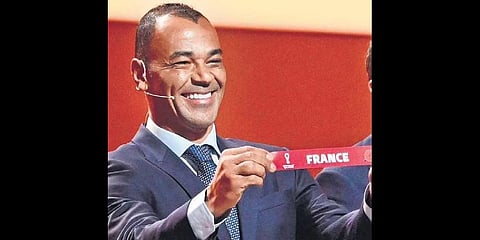

DOHA: Looking from the sky before touching down at Doha’s Hamad International Airport, Stadium 974 does not look all that different to other stadia. But when you reach the venue, its uniqueness stands out. The colourful recycled shipping containers grab immediate attention along with the visible modular steel framework.
The 40,000-seater venue has been given its name Stadium 974 — formerly known as Ras Abu Aboud — for two reasons. Apart from Qatar’s international dialling number being 974, it is also the exact number of shipping containers that have been used in the overall makeup of the stadium. The latter was brought from China, and the construction was completed last year. Some of the containers at the stadium have been used for medical rooms among many other facilities.
Also, the modular design of the stadium meant less use of regular materials when compared to other stadiums across the world. It is one of the more cost-effective stadia in the upcoming edition of the World Cup, which starts in November, and the design has been done in such a way that it is naturally ventilated and the cool breeze from the sea is always a big plus.
What impresses one even further is how the stadium is the first of its kind in World Cup history as it is fully demountable. In fact, sustainability and legacy were always a part of Qatar’s commitment when they bid to host the World Cup in the first place.
“This stadium and design are a great example of it (sustainability), because the legacy plans are very clear. What we are doing with this stadium is after the tournament we are avoiding the white elephant or a facility that has no use after the WC,” said Stadium 974 manager Mohamed Alatwaan.
Once the quadrennial event is over, there are plenty of options, which they can explore. They can take the entire things elsewhere and build the same in a new country while they can also use the containers for shipping purposes. Their ideas have a full-scale potential to leave a legacy in the World Cup.
“We have flexibility in our design that we can rebuild the stadium in a different location with the same capacity. We can take the whole thing somewhere else. We have a strategy for this. Also, we have maintained the certification of the shipping containers, we can reuse the containers for shipping purposes, and the steel can be recycled for any construction. The location is available for any future development. It is a prime location with a great view of the Doha Skyline as well.” he said.
Such plans have a huge potential to become a game-changer for nations that host the Olympic Games in the future. Some of the stadia and facilities used in the different editions of the Games in the past have been abandoned, but if Qatar’s plan is used in the future, such a scenario might not arise.
The author is in Doha at the invitation from Qatar Tourism